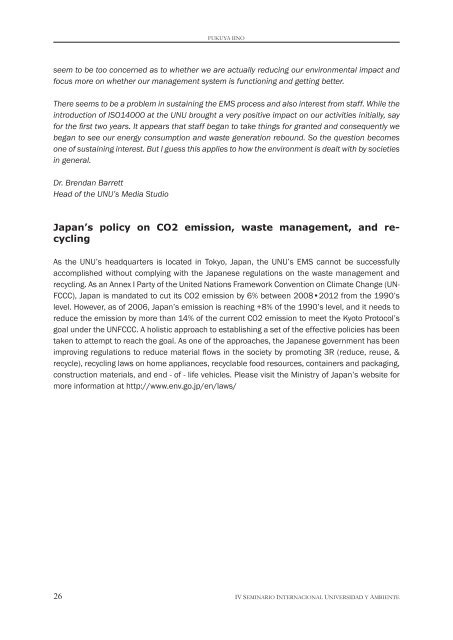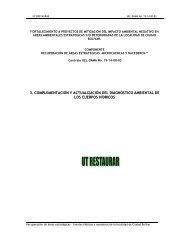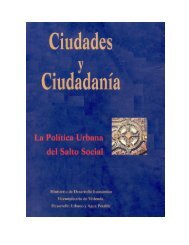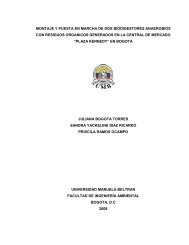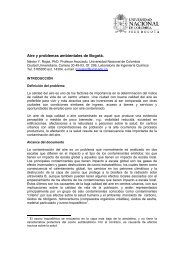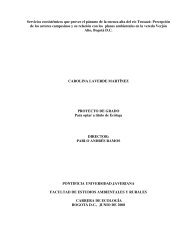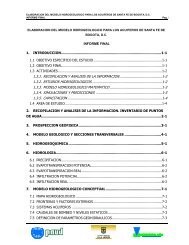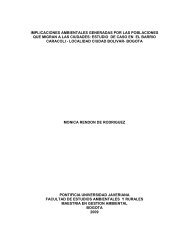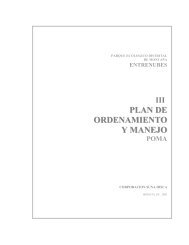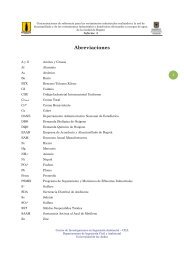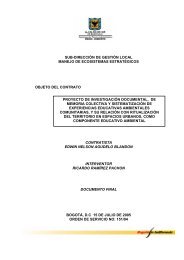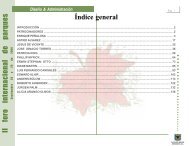- Page 1 and 2: UNIVERSIDAD DE CIENCIAS APLICADAS Y
- Page 3 and 4: MEMORIAS DEL IV SEMINARIO INTERNACI
- Page 5 and 6: Presentación Orlando Sáenz EXPERI
- Page 7 and 8: Presentación Como parte de las cel
- Page 9 and 10: PRESENTACIÓN En primer término, d
- Page 11 and 12: PRESENTACIÓN A este llamado han re
- Page 13 and 14: ENVIRONMENTAL MANAGEMENT SYSTEM (EM
- Page 15 and 16: ENVIRONMENTAL MANAGEMENT SYSTEM (EM
- Page 17 and 18: ENVIRONMENTAL MANAGEMENT SYSTEM (EM
- Page 19 and 20: ENVIRONMENTAL MANAGEMENT SYSTEM (EM
- Page 21 and 22: ENVIRONMENTAL MANAGEMENT SYSTEM (EM
- Page 23 and 24: ENVIRONMENTAL MANAGEMENT SYSTEM (EM
- Page 25: ENVIRONMENTAL MANAGEMENT SYSTEM (EM
- Page 29 and 30: GESTIÓN AMBIENTAL EN LA UNIVERSIDA
- Page 31 and 32: Niveles de ruido GESTIÓN AMBIENTAL
- Page 33 and 34: GESTIÓN AMBIENTAL EN LA UNIVERSIDA
- Page 35 and 36: GESTIÓN AMBIENTAL EN LA UNIVERSIDA
- Page 37 and 38: GESTIÓN AMBIENTAL EN LA UNIVERSIDA
- Page 39 and 40: Movilidad - Transporte GESTIÓN AMB
- Page 41 and 42: Programa: Ambientalización curricu
- Page 43 and 44: EJE II GESTIÓN AMBIENTAL EN LA UNI
- Page 45 and 46: Presentación LA GESTIÓN AMBIENTAL
- Page 47 and 48: LA GESTIÓN AMBIENTAL EN LA UNIVERS
- Page 49 and 50: LA GESTIÓN AMBIENTAL EN LA UNIVERS
- Page 51 and 52: LA GESTIÓN AMBIENTAL EN LA UNIVERS
- Page 53 and 54: LA GESTIÓN AMBIENTAL EN LA UNIVERS
- Page 55 and 56: LA GESTIÓN AMBIENTAL EN LA UNIVERS
- Page 57 and 58: LA GESTIÓN AMBIENTAL EN LA UNIVERS
- Page 59 and 60: LA UNIVERSIDAD COMO REFERENTE SOCIA
- Page 61 and 62: LA UNIVERSIDAD COMO REFERENTE SOCIA
- Page 63 and 64: LA UNIVERSIDAD COMO REFERENTE SOCIA
- Page 65 and 66: LA UNIVERSIDAD COMO REFERENTE SOCIA
- Page 67 and 68: LA UNIVERSIDAD COMO REFERENTE SOCIA
- Page 69 and 70: LA UNIVERSIDAD COMO REFERENTE SOCIA
- Page 71 and 72: LA UNIVERSIDAD COMO REFERENTE SOCIA
- Page 73 and 74: LA UNIVERSIDAD COMO REFERENTE SOCIA
- Page 75 and 76: LA UNIVERSIDAD COMO REFERENTE SOCIA
- Page 77 and 78:
LA GESTIÓN AMBIENTAL EN LA UNIVERS
- Page 79 and 80:
LA GESTIÓN AMBIENTAL EN LA UNIVERS
- Page 81 and 82:
LA GESTIÓN AMBIENTAL EN LA UNIVERS
- Page 83 and 84:
LA GESTIÓN AMBIENTAL EN LA UNIVERS
- Page 85 and 86:
LA GESTIÓN AMBIENTAL EN LA UNIVERS
- Page 87 and 88:
LA GESTIÓN AMBIENTAL EN LA UNIVERS
- Page 89 and 90:
LA GESTIÓN AMBIENTAL EN LA UNIVERS
- Page 91 and 92:
HACIA UN CAMPUS SUSTENTABLE. UNIVER
- Page 93 and 94:
HACIA UN CAMPUS SUSTENTABLE. UNIVER
- Page 95 and 96:
EL SISTEMA DE MANEJO AMBIENTAL DE L
- Page 97 and 98:
EL SISTEMA DE MANEJO AMBIENTAL DE L
- Page 99 and 100:
EL SISTEMA DE MANEJO AMBIENTAL DE L
- Page 101 and 102:
EL SISTEMA DE MANEJO AMBIENTAL DE L
- Page 103 and 104:
EL SISTEMA DE MANEJO AMBIENTAL DE L
- Page 105 and 106:
EL SISTEMA DE MANEJO AMBIENTAL DE L
- Page 107 and 108:
EL SISTEMA DE MANEJO AMBIENTAL DE L
- Page 109 and 110:
EL SISTEMA DE MANEJO AMBIENTAL DE L
- Page 111 and 112:
EXPERIENCIAS EN LA GESTIÓN AMBIENT
- Page 113 and 114:
EXPERIENCIAS EN LA GESTIÓN AMBIENT
- Page 115 and 116:
EXPERIENCIAS EN LA GESTIÓN AMBIENT
- Page 117 and 118:
EXPERIENCIAS EN LA GESTIÓN AMBIENT
- Page 119 and 120:
EXPERIENCIAS EN LA GESTIÓN AMBIENT
- Page 121 and 122:
EXPERIENCIAS EN LA GESTIÓN AMBIENT
- Page 123 and 124:
EXPERIENCIAS EN LA GESTIÓN AMBIENT
- Page 125 and 126:
LA GESTIÓN AMBIENTAL EN LA UNIVERS
- Page 127 and 128:
GESTIÓN AMBIENTAL DE LA U.D.C.A: H
- Page 129 and 130:
GESTIÓN AMBIENTAL DE LA U.D.C.A: H
- Page 131 and 132:
GESTIÓN AMBIENTAL DE LA U.D.C.A: H
- Page 133 and 134:
GESTIÓN AMBIENTAL DE LA U.D.C.A: H
- Page 135 and 136:
GESTIÓN AMBIENTAL DE LA U.D.C.A: H
- Page 137 and 138:
GESTIÓN AMBIENTAL DE LA U.D.C.A: H
- Page 139 and 140:
GESTIÓN AMBIENTAL DE LA U.D.C.A: H
- Page 141 and 142:
GESTIÓN AMBIENTAL DE LA U.D.C.A: H
- Page 143 and 144:
GESTIÓN AMBIENTAL DE LA U.D.C.A: H
- Page 145 and 146:
GESTIÓN AMBIENTAL DE LA U.D.C.A: H
- Page 147 and 148:
GESTIÓN AMBIENTAL DE LA U.D.C.A: H
- Page 149 and 150:
SISTEMA DE GESTIÓN AMBIENTAL EN EL
- Page 151 and 152:
SISTEMA DE GESTIÓN AMBIENTAL EN EL
- Page 153 and 154:
SISTEMA DE GESTIÓN AMBIENTAL EN EL
- Page 155 and 156:
SISTEMA DE GESTIÓN AMBIENTAL EN EL
- Page 157 and 158:
SISTEMA DE GESTIÓN AMBIENTAL EN EL
- Page 159 and 160:
Resumen EXPERIENCIA EN LA FORMULACI
- Page 161 and 162:
EXPERIENCIA EN LA FORMULACIÓN Y PU
- Page 163 and 164:
EXPERIENCIA EN LA FORMULACIÓN Y PU
- Page 165 and 166:
EXPERIENCIA EN LA FORMULACIÓN Y PU
- Page 167 and 168:
EXPERIENCIA EN LA FORMULACIÓN Y PU
- Page 169 and 170:
EXPERIENCIA EN LA FORMULACIÓN Y PU
- Page 171 and 172:
EXPERIENCIA EN LA FORMULACIÓN Y PU
- Page 173 and 174:
LA GESTIÓN AMBIENTAL INSTITUCIONAL
- Page 175 and 176:
LA GESTIÓN AMBIENTAL INSTITUCIONAL
- Page 177 and 178:
LA GESTIÓN AMBIENTAL INSTITUCIONAL
- Page 179 and 180:
LA GESTIÓN AMBIENTAL INSTITUCIONAL
- Page 181 and 182:
LA GESTIÓN AMBIENTAL INSTITUCIONAL
- Page 183 and 184:
LA GESTIÓN AMBIENTAL INSTITUCIONAL
- Page 185 and 186:
LA GESTIÓN AMBIENTAL INSTITUCIONAL
- Page 187 and 188:
LA GESTIÓN AMBIENTAL INSTITUCIONAL
- Page 189 and 190:
LA GESTIÓN AMBIENTAL INSTITUCIONAL
- Page 191 and 192:
LA GESTIÓN AMBIENTAL INSTITUCIONAL
- Page 193 and 194:
Resumen PLAN DE MANEJO AMBIENTAL EN
- Page 195 and 196:
PLAN DE MANEJO AMBIENTAL EN LA UNIV
- Page 197 and 198:
PLAN DE MANEJO AMBIENTAL EN LA UNIV
- Page 199 and 200:
PLAN DE MANEJO AMBIENTAL EN LA UNIV
- Page 201 and 202:
PLAN DE MANEJO AMBIENTAL EN LA UNIV
- Page 203 and 204:
PLAN DE MANEJO AMBIENTAL EN LA UNIV
- Page 205 and 206:
EL PLAN DE REGULARIZACIÓN Y MANEJO
- Page 207 and 208:
EL PLAN DE REGULARIZACIÓN Y MANEJO
- Page 209 and 210:
EL PLAN DE REGULARIZACIÓN Y MANEJO
- Page 211 and 212:
EL PLAN DE REGULARIZACIÓN Y MANEJO
- Page 213 and 214:
EL PLAN DE REGULARIZACIÓN Y MANEJO
- Page 215 and 216:
EL PLAN DE REGULARIZACIÓN Y MANEJO
- Page 217 and 218:
EL PLAN DE REGULARIZACIÓN Y MANEJO
- Page 219 and 220:
EL PLAN DE REGULARIZACIÓN Y MANEJO
- Page 221 and 222:
EL PLAN DE REGULARIZACIÓN Y MANEJO
- Page 223 and 224:
EL PLAN DE REGULARIZACIÓN Y MANEJO
- Page 225 and 226:
EL PLAN DE REGULARIZACIÓN Y MANEJO
- Page 227 and 228:
EL PLAN DE REGULARIZACIÓN Y MANEJO
- Page 229 and 230:
EL PLAN DE REGULARIZACIÓN Y MANEJO
- Page 231 and 232:
LA GESTIÓN AMBIENTAL EN LA UNIVERS
- Page 233 and 234:
GESTIÓN AMBIENTAL Y ORDENAMIENTO D
- Page 235 and 236:
GESTIÓN AMBIENTAL Y ORDENAMIENTO D
- Page 237 and 238:
GESTIÓN AMBIENTAL Y ORDENAMIENTO D
- Page 239 and 240:
GESTIÓN AMBIENTAL Y ORDENAMIENTO D
- Page 241 and 242:
GESTIÓN AMBIENTAL Y ORDENAMIENTO D
- Page 243 and 244:
GESTIÓN AMBIENTAL Y ORDENAMIENTO D
- Page 245 and 246:
GESTIÓN AMBIENTAL Y ORDENAMIENTO D
- Page 247 and 248:
GESTIÓN AMBIENTAL Y ORDENAMIENTO D
- Page 249 and 250:
GESTIÓN AMBIENTAL Y ORDENAMIENTO D
- Page 251 and 252:
GESTIÓN AMBIENTAL Y ORDENAMIENTO D
- Page 253 and 254:
GESTIÓN AMBIENTAL Y ORDENAMIENTO D
- Page 255 and 256:
GESTIÓN AMBIENTAL Y ORDENAMIENTO D
- Page 257 and 258:
GESTIÓN AMBIENTAL Y ORDENAMIENTO D
- Page 259 and 260:
GESTIÓN AMBIENTAL Y ORDENAMIENTO D
- Page 261 and 262:
GESTIÓN AMBIENTAL Y ORDENAMIENTO D
- Page 263 and 264:
GESTIÓN AMBIENTAL Y ORDENAMIENTO D
- Page 265 and 266:
GESTIÓN AMBIENTAL Y ORDENAMIENTO D
- Page 267 and 268:
GESTIÓN AMBIENTAL Y ORDENAMIENTO D
- Page 269 and 270:
GESTIÓN AMBIENTAL Y ORDENAMIENTO D
- Page 271 and 272:
GESTIÓN AMBIENTAL Y ORDENAMIENTO D
- Page 273 and 274:
GESTIÓN AMBIENTAL Y ORDENAMIENTO D
- Page 275 and 276:
GESTIÓN AMBIENTAL Y ORDENAMIENTO D
- Page 277 and 278:
GESTIÓN AMBIENTAL Y ORDENAMIENTO D
- Page 279 and 280:
GESTIÓN AMBIENTAL Y ORDENAMIENTO D
- Page 281 and 282:
GESTIÓN AMBIENTAL Y ORDENAMIENTO D
- Page 283 and 284:
GESTIÓN AMBIENTAL Y ORDENAMIENTO D
- Page 285 and 286:
GESTIÓN AMBIENTAL Y ORDENAMIENTO D
- Page 287 and 288:
GESTIÓN AMBIENTAL Y ORDENAMIENTO D
- Page 289 and 290:
GESTIÓN AMBIENTAL Y ORDENAMIENTO D
- Page 291 and 292:
GESTIÓN AMBIENTAL Y ORDENAMIENTO D


